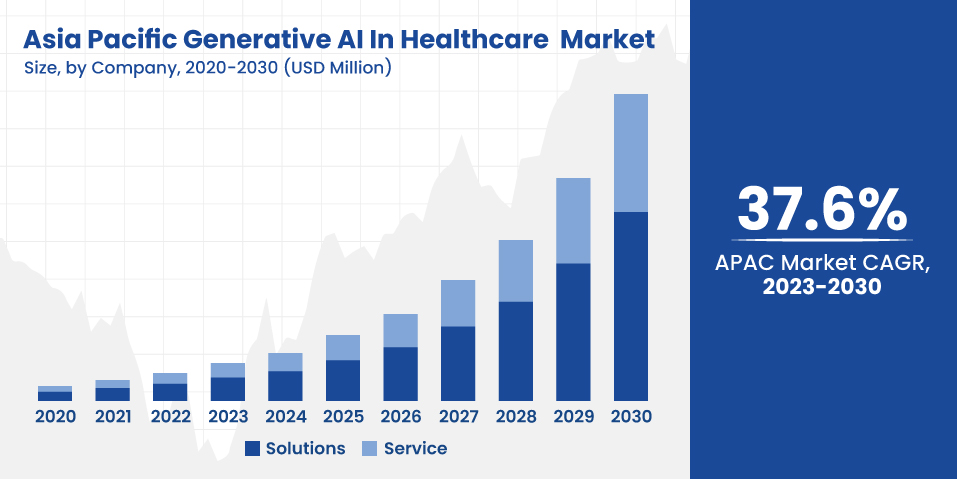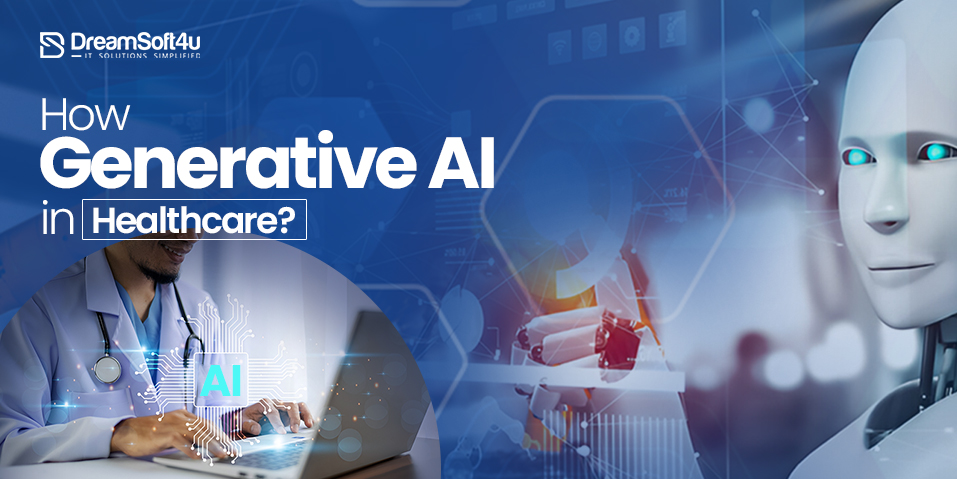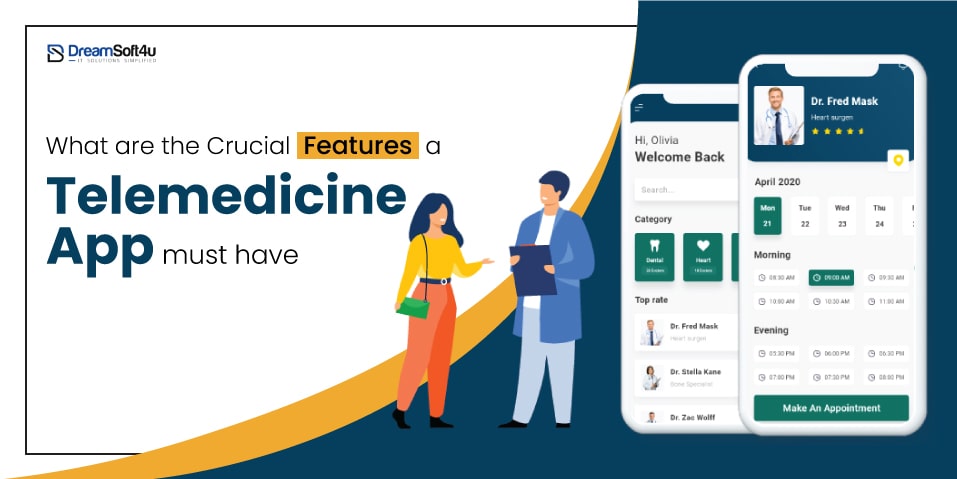Generative AI in healthcare is bringing a massive transformation to the healthcare sector, just like it is impacting several other industries worldwide. Generative AI is a form of artificial intelligence that creates new content such as text, images, music, and synthetic data. According to a report, the global generative AI in healthcare market was valued at USD 1.28 billion in 2022 . This is expected to grow at a CAGR of 37.6% between 2023 to 2030.
In today’s highly advanced time, experts in the healthcare sector, including doctors, nurses, and more, rely on generative AI. It is a powerful tool that analyses medical records and bulk data, offers personalised treatment plans, checks symptoms, and facilitates accurate diagnoses. If you’re someone from the healthcare industry and want to know how generative AI is helping in the medical sector, we have got you covered.
This article explores how generative AI helps in healthcare, including its use cases, benefits, and challenges. Here we go!

Table of Contents
ToggleIntroduction To Generative AI
Generative AI, offered through our generative AI development services, is referred to as artificial intelligence used to produce excellent quality content in various formats. These include text, audio, synthetic data, and images. In the past few years, generative AI has gained a lot of attention as it comes with a simple interface and overall design, which attracts even non-tech-savvy people. Additionally, it produces high-quality videos, images, text, and graphics in seconds.
This technology uses machine learning and deep learning models to analyze large datasets and generate content aligned with the input data. Generative AI works by training, learning, and generating new, similar data. For example, you simply provide a prompt to generative AI, and it will produce text, images, audio, and more.
Healthcare businesses, in particular, have started leveraging generative AI development services as this technology differs from traditional artificial intelligence, which was built strictly on predefined rules.
Introduction of Generative AI in the Healthcare Industry
According to the latest report, advances in the languages used by generative AI models are revolutionizing the healthcare industry, resulting in productivity and creativity for healthcare experts as well as patients. The healthcare industry deals with huge chunks of data every day that require human intervention so that the extracted data can be used.
With the introduction of generative AI in healthcare industry, all unstructured data is analyzed properly to extract insightful information that helps healthcare experts make better diagnoses and improve treatment plans. Although the use of artificial intelligence is not new in the healthcare industry, generative AI is unblocking the potential for improvement in the healthcare sector.
Whether you want to eliminate mistakes from error-prone processes, automate tedious and repetitive work, or modernize the healthcare infrastructure, generative AI handles it all effectively. Above all, generative AI minimizes the chances of fraud and data breaches, ensuring all confidential information is well-protected.
Generative Artificial Intelligence Use Cases In Healthcare Industry
Here are the top generative AI healthcare use cases industry-wise:
1. Medical Simulation
Using generative AI, medical simulations can be created to train and guide healthcare experts, including nurses, doctors, and others, that results in enhanced patient care. For example, experts at the University of Michigan have developed a generative AI algorithm to test a life-threatening condition called sepsis.
2. Enhanced Drug Discovery
In recent years, generative AI is also used in drug discovery and development processes. Above all, it has shown promising results. Now, healthcare experts and scientists do not depend on traditional and outdated methods like faxed medical records, snail-mailed findings, and manual patient diary entries. The introduction of generative AI is bringing a change in these practices. Earlier, drug discovery was costly and time-consuming; generative AI now accelerates the process using AI algorithms.
3. Clinical Decision Making
One major use case of generative AI is clinical decision-making. Since generative AI is great at examining diverse and complex data, it is an excellent medical option to highlight underlying healthcare problems and suggest further treatment steps. Besides diagnosis, generative AI also suggests tailored treatment plans so that the patients receive extensive and effective care.
4. Medical Chatbots
Generative AI has introduced medical chatbots, which offer patients personalized medical attention and advice when required. For example, a company has developed a generative AI medical chatbot. Now, the chatbot will ask patients about their problems, underlying symptoms, past medical history, and more to deliver personalized plans and medical care.
5. Medical Research
Generative AI is used widely in medical research as the machine learning algorithm identifies patterns related to specific medical research topics. Through this, researchers can find new areas of work and develop new hypotheses. For example, researchers use generative AI in Healthcare to determine new drug targets. By exploring large datasets and information, new proteins and genes related to the disease can be identified, giving researchers new targets.
6. Medical Imaging
Healthcare businesses have used AI technology for medical imaging. The machine learning algorithm can learn from a huge bulk of data of related images and come up with high-quality and high-resolution images that are better than the original ones, allowing healthcare experts, including doctors and nurses, to identify underlying health issues and make accurate diagnoses of the problem. For example, you can trace out high-resolution images of the brain using generative AI technology. Based on the image, doctors can determine any underlying problems or detect changes pointing toward diseases.
7. Predicting Catastrophic Health Events
Generative AI is becoming an exceptional choice as it can predict catastrophic health events. They are known for offering valuable information about COVID-19 and its preventive measures to people studying it. They also analyze huge piles of data and determine antibodies to tackle infections. Thus, it can be said that generative AI predicts catastrophic health events and addresses all infectious diseases.
8. Personalized Treatment Plans
In today’s highly advanced world and growing healthcare facilities, people are relying on personalized healthcare and treatment options. All of this is because of generative AI apps and wearable technology in the healthcare landscape.
Challenges Of AI Generative In The Healthcare Sector
Here are some major challenges of generative AI in healthcare sector:
1. Ethical Considerations
When it comes to generative AI in the healthcare sector, there are certain ethical concerns. For example, concerns regarding security and privacy always exist when professionals use a patient’s personal information to train the generative AI algorithm. Besides this, concerns about the generative AI algorithms can take a toll on you, which increases the chances of disparities in the outcomes. Some major ethical concerns associated with the healthcare sector are circulating toxic content, data privacy violations, lack of transparency, workforce displacement, and more.
2. Privacy And Security
According to a report, every organization using generative AI deals with privacy and security as one of their primary concerns. At times, all confidential information about the patient may get leaked through various sources, which disrupts overall privacy and security. Although a generative AI model is trained to handle sensitive information, the chances of exploitation are still present. Thus, proper encryption techniques and data anonymization are implemented during healthcare app development to protect critical user information.
3. Large Datasets Required
Another major challenge of generative AI in healthcare sector is that it requires large datasets from which to learn. In certain cases, it becomes difficult to get your hands on these datasets, or at times, they may not exist. This limits the effectiveness and working conditions of generative AI in certain healthcare areas. Thus, it has evolved into a major challenge for all people in the healthcare sector.
4. Fairness And Bias
Oftentimes, it is seen that generative AI can display biased results as these can inherit biases in the training information, causing biased results. Its effects can be seen in various areas, including the recruitment process and healthcare. For the responsible deployment of artificial intelligence, addressing biases and implementing fairness in the system is important.
Future Of AI Generative In The Healthcare Industry
Generative artificial intelligence, or AI, has already established itself in the healthcare industry. However, its transformation has just begun, as there is a lot that it can offer. A report states that 92% of people believe generative AI enhances efficacy, and 65% believe that it promotes quicker and better decision-making. Thus, it can be said that the future of generative AI in healthcare industry is extremely bright and is going nowhere. However, improvements are required continuously to protect patients’ privacy and security. Regular improvements and updates are made to achieve this goal.
Ready to build next-generation healthcare applications?
Work with experienced healthcare and generative AI professionals to build compliant, future-ready applications.
Why Choose DreamSoft4U?
DreamSoft4U is a US-based company that offers excellent cutting-edge software development solutions and generative AI services. It majorly caters to industries like hospitality, education, travel, tourism, healthcare & fitness, media and entertainment, and more. Looking to design and develop your generative AI apps or software? You can get in touch with experts at DreamSoft4U who help you at every step.
Here, professionals are highly experienced and deliver world-class solutions. Some major services offered at Dreamsoft4U are software development services, custom healthcare software development, telemedicine Custom healthcare app development, mHealth App Development, healthcare IT consulting, and more. Get these services today and enjoy exponential growth and development.
Commonly Asked Questions
1. What is artificial intelligence?
Artificial intelligence, commonly known as AI, is the computer’s ability to perform everyday tasks like humans. These tasks include learning, reasoning, interpreting, and more. Some major AI tool specifications are speech recognition, natural language processing, expert systems, and machine vision. AI is a man-made technology that frees up humans and gives them enough time to make growth strategies and focus on other vital aspects of a business.
2. What are the advantages of generative AI in the healthcare sector?
Some significant advantages of generative AI in healthcare sector include
- Promoting faster diagnoses and personalized treatment plans
- Enhanced and faster decision-making that contributes to growth
- Increased patient’s engagement with medical chatbots
- Ability to conduct detailed medical research on different drugs and infections
- Easier data management as no human intervention is needed
3. What are the significant challenges of generative AI in the healthcare industry?
Generative AI is a popular type of AI, bringing a revolution in the healthcare industry. Additionally, it is reshaping the medical sector by enabling personalized treatment, accurate diagnosis, and more. However, there are certain challenges that generative AI in Healthcare industry experiences. These challenges are needed for large datasets, bias, privacy and ethical concerns, and more transparency. However, new technologies are underdeveloped to tackle these challenges.
4. What is the major objective of generative AI in the healthcare industry?
The major objectives of generative AI in healthcare industry are enhancing diagnostics, expediting drug discovery, personalizing treatments, and facilitating medical research.
5. What are the top ways artificial intelligence improves the healthcare sector?
Here are the top ways AI tools make the healthcare sector operations more efficient:
- By introducing artificial intelligence in the healthcare sector, functions like sorting paperwork and other administrative tasks can be handled easily.
- AI provides round-the-clock support by solving patients’ queries and delivering answers timely.
- One major drawback of the healthcare industry is errors in the dosage. AI solves this problem by eliminating human intervention.
- Surgeons today are using AI-powered robots to perform surgeries, which minimizes all potential risk factors like infection in the body.
Wrapping Up
The generative AI in the healthcare industry is booming and will be more evident as technology develops. By lowering costs, sorting huge piles of data, enhancing patient care, and boosting operational efficiency and working, generative AI has brought a revolution in healthcare and all other industries in the world. The applications of generative AI in healthcare industry are enormous.
From analyzing data to making accurate diagnoses and developing personalized treatment plans, all is possible through generative AI. However, generative AI has certain disadvantages or challenges that must be tackled. However, continuous studies are being performed to find effective solutions. In all, it can be said generative AI is helping the healthcare industry like never before!


















